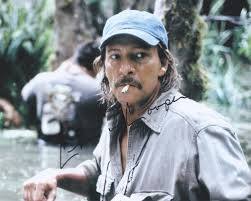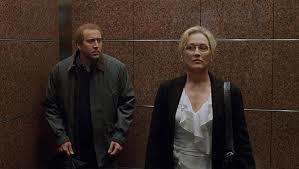How Writers Screw Up, Part One
For part of my time in Hollywood, I worked with a partner. I called him “Stanley” in Nobody Wants To Read Your Sh*t so I’ll continue that protocol here.

Chris Cooper won the Oscar as Best Supporting Actor for his role in Charlie Kaufman’s “Adaptation”
Stanley was an established writer. He had been the force behind two big hits. I was the junior member of the team.
Stanley was also a major sci-fi enthusiast. He had read all the magazines, the short stories, the novels, the collections. One of the ways Stanley developed movie projects (he was a producer too) was to option a short story or novella by, say, Philip K. Dick and then adapt the piece as a screenplay.
Sci-fi short stories and novels [Stanley used to say] almost never work in the form in which we find them and acquire them. They’re part-stories. They’re half-stories.
This reality was a giant plus in Stanley’s eyes, because it meant he could option these pieces for peanuts, whip them into shape, and sell them as movies.
Stanley made me read a raft of these sci-fi works.
See how they all stop halfway through? The writer will have come up with a brilliant premise, like the idea of “replicants” and “blade runners” or the concept of erasing or implanting memories. But they almost never take the idea to a dramatic conclusion. They stop at Act One.
Or they’ll come up with fantastic heroes but without the right villains. There’s no theme. There’s no climax. There’s no third act.
Stanley didn’t fault these sci-fi writers. He was in awe of them just for their gift for coming up with such wild-and-crazy premises.
In Stanley’s view it was our job—the screenwriters who would adapt these novellas and short stories—to finish the work that the original writer had started.
Our job was to save her.
To make her stuff work
Have you seen Adaptation, written by the great screenwriter Charlie Kaufman? The movie is not science fiction but the problem its writing presents is exactly what we’re talking about here. The adapting screenwriter, “Charlie Kaufman,” accepts an assignment to write a script based on a Susan Orlean article in the New Yorker. The piece is about orchids.
In other words, there’s no readily apparent movie there.
The adapting writer, “Charlie Kaufman,” has to come up with a hero, a villain, an Act One, Act Two, Act Three.
If you haven’t seen the movie, Netflix it. It’s hysterical, with great performances by Nicolas Cage, Meryl Streep, and Chris Cooper.
But back to what we were talking about.
Why am I bringing this subject up?
What’s the point of exploring half-stories and part-stories?
Because that is exactly the problem you and I have when we write a novel and it crashes halfway through.
[Sorry, you guys. I promised last week I would stop writing these “Reports From The Trenches,” but I’ve had a few more ideas since then so I’m gonna keep going for another week or two.]
What I’m trying to say is that when you and I write a draft of a novel and the damn thing DOESN’T WORK, we find ourselves in the same position as Stanley after he options a Philip K. Dick short story or Charlie Kaufman when he signs a contract to adapt a magazine piece about flowers.

Nicolas Cage as Charlie Kaufman and Meryl Streep as Susan Orlean
We are stuck with a half-story.
The only difference is we did it ourselves.
We didn’t have to acquire the half-story from another writer; we banged the sucker out all by ourselves.
Again, why am I beating this nearly-extinct horse?
Because before you and I can chart our course for Tahiti, we have to know WHERE WE ARE EMBARKING FROM.
This challenge is, as I observed earlier in this series, “writing at the Ph.D. level” and “overcoming Resistance at the Ph.D. level.”
Our assignment, yours and mine as we stand over the smoldering wreckage of our half-story/half-novel, is to
Acquire objectivity about the material
Detach ourselves emotionally from our own prior work
Mentally regroup, so that we can summon our courage
Open our minds to every new and fresh story possibility
Start again from Square One.
Can we do it?
Will we fold?
Is the challenge too daunting?
Are we too attached to our original (half) story to let it go?
Lemme rephrase what I said about Ph.D.s.
This isn’t about a distinction between academic levels.
This is about the difference between being a professional and being an amateur.
We may have thought, you and I, when we started out in this business (I use that word deliberately, in contrast to “art”) that it was easy.
It ain’t.



